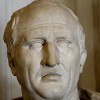“ For man not only loves himself, but seeks another whose spirit he may so blend with his own as almost to make one being of two. ”
Marcus Tullius Cicero, On Friendship (44 BC). copy citation
| Author | Marcus Tullius Cicero |
|---|---|
| Source | On Friendship |
| Topic | love spirit |
| Date | 44 BC |
| Language | English |
| Reference | |
| Note | Translated by E. S. Shuckburgh |
| Weblink | http://www.gutenberg.org/files/2808/2808-h/2808-h.htm |
Context
“and, secondly, an eagerness to find and attach themselves to other creatures of their own kind; and if this natural action is accompanied by desire and by something resembling human love, how much more must this be the case in man by the law of his nature? For man not only loves himself, but seeks another whose spirit he may so blend with his own as almost to make one being of two.
22. But most people unreasonably, not to speak of modesty, want such a friend as they are unable to be themselves, and expect from their friends what they do not themselves give. The fair course is first to be good yourself, and then to look out for another of like character.”
source


